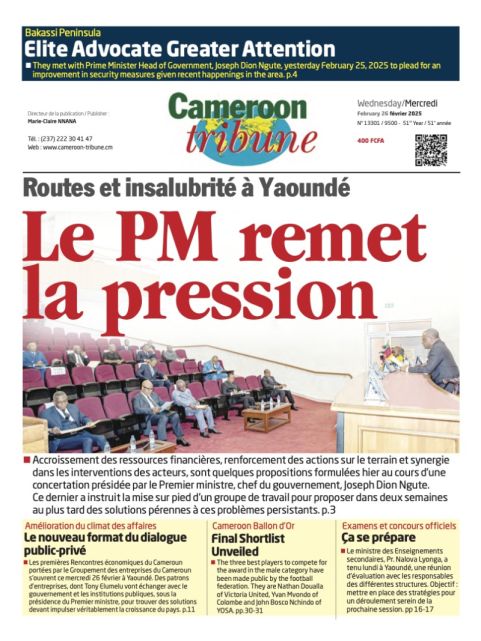Cocoa Production & Deforestation : Need For Courageous Strategy
The sword of Damocles is henceforth dangling over producers of cocoa aiming at the European market. From 2025, Europe, through their Union Law, may not buy cocoa again from producing countries they deem not protecting local forests enough. By all indications, Cameroon is among the cocoa producers still looking up to the European market.
The threatening news fell like a hair in the soup of cocoa producers especially in Cameroon where cocoa sale had just soared from FCFA 1,500 per kg in September, 2023, to FCFA 4,225 in February, 2024. What explains the cocoa price rise will constitute a chapter for experts. Meantime, economic enthusiasts are linking the windfall to the recent progress made by leading producers like Côte d’Ivoire and Ghana to process their cocoa locally into final consumable products. That caused a supply dearth in the global cocoa market leading to higher demand.
The European Union and their Parliament are agreeing on a new law to prevent the selling into their market such produce as cocoa, coffee, wood, meat, soybean and other commodities connected to deforestation around the world. The new dispensation by the EU is pinned on forest preservation, which is rooted in the necessary fight against climate change. The law will require for produce sellers and buyers for the EU market to provide prior due diligence statement attesting their supplies are not tributary to forests degradation.
The European Parliament's lead negotiator, Christophe Hansen, is quoted in the social media as saying "I hope that this innovative regulation will give impetus to the protection of forests around the globe and inspire other countries at the COP15."
The seriousness of the new EU Law is seen in its extensive application to affect derived products including palm oil, leather, chocolate, charcoal, furniture, and rubber. As precision, this new pursuit only concerns lands deforested after 2020. It is equally expected that the EU would work with affected countries to sharpen skills necessary to put the rules into practice.
However hot the new dispensation may be for producers and buyers of deforestation-linked produce, it is meant for adoption by the European Parliament and Council in April and May in 2024. It is digested as an opportunity to ensure that humans across the globe play a part in halting and reversing deforestation.
Whatever details and drawbacks buyers, sellers and consumers interest groups may place on farm produce, luminaries have warned that economic development, local community welfare and the global climate change worries must be taken into consideration.
Experts have put it that up to 25 per cent of GDP in Africa comes from agriculture, which also assures 60 per cent of employment. The survival of this sector means good for West Africa where cocoa is their hope. Cocoa remains a critical source of financial income for people in that part of the world. Yet, the advantages that go with preserving nature are undeniable. If the climate gets terrible because of pollution, non-forest, and non-biodiversity, there may be no oxygen for living beings in the future.
The question, however, itches like how do they make farms without inching into the forest? Is it that man must invent new farming systems only for deserts to spare the forests? Can cocoa, the focus of this piece, grow in deserts? The African population is said to be growing in numbers to hit some 2.5 billion in the next 25 years. Their needs will evidently grow in food and money. That may explain why applauded bodies like the World Wide Fund for Nature (WWF) and the Tropical Forest Alliance (TFA) are afield in central African countries including Cameroon to establish dialogue and try to preserve nature for the interest of all living beings.
Concerns are raised about legal framework, administrative measures, production and financial resources to address deforestation. Attempts to answer those worries require such holistic approach that considers interconnection among stakeholders. There is genuine need to work together to reach common goals. Cocoa producer countries must seek to build capacity in sustainable farming methods, quality improvement, and compliance with international requirements. Above all, producers...
Cet article complet est réservé aux abonnés
Déjà abonné ? Identifiez-vous >
Accédez en illimité à Cameroon Tribune Digital à partir de 26250 FCFA
Je M'abonne1 minute suffit pour vous abonner à Cameroon Tribune Digital !
- Votre numéro spécial cameroon-tribune en version numérique
- Des encarts
- Des appels d'offres exclusives
- D'avant-première (accès 24h avant la publication)
- Des éditions consultables sur tous supports (smartphone, tablettes, PC)











Commentaires